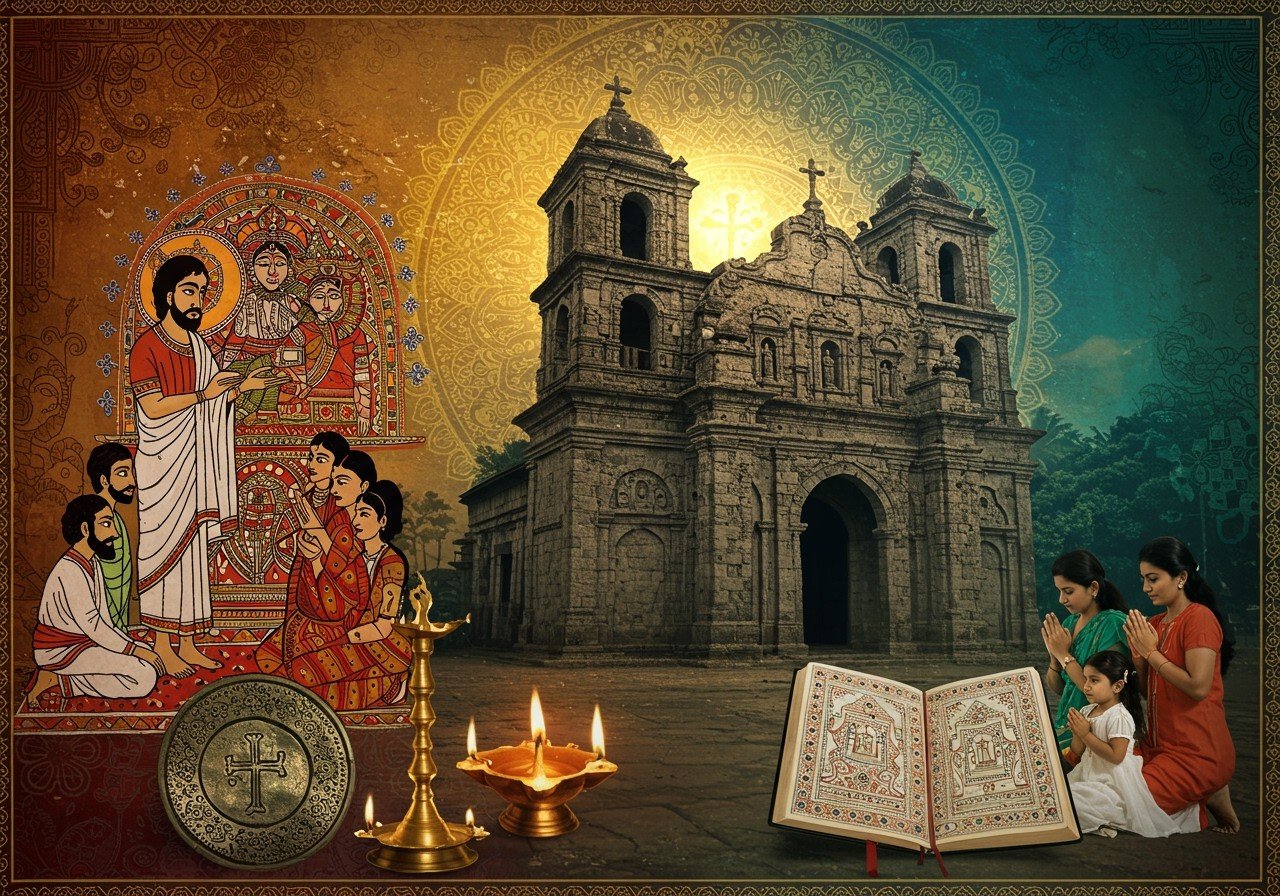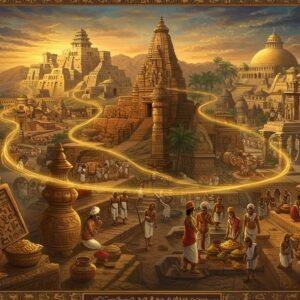
Christianity in India boasts a rich and intricate history spanning almost two millennia. From the arrival of Apostle Thomas in the first century to the flourishing Christian communities of today, this faith has intricately woven itself into India’s diverse cultural tapestry. This article delves into a comprehensive historical overview of Christianity in India, exploring its origins, development, obstacles, and present-day standing.
Arrival of Apostle Thomas (52 AD)
Tradition dictates that Apostle Thomas arrived in India circa 52 AD, introducing Christianity to the Malabar Coast. This event holds immense historical and religious significance. Apostle Thomas is believed to have founded several communities, notably in Kerala. Ancient texts and archaeological discoveries provide evidence supporting these traditions. This early Christian presence influenced local customs and traditions, gradually expanding from its initial communities to other regions of India.
Growth and Development during the Colonial Period (16th Century Onwards)
European colonial powers, including the Portuguese, Dutch, British, and French, played a significant role in the expansion of Christianity in India from the 16th century onwards. Missionaries established churches, schools, and hospitals, leaving a lasting impact on indigenous Christian practices by integrating European liturgical traditions. Notable figures like Francis Xavier and Roberto de Nobili made substantial contributions. Christian missions also played a crucial role in social reform, particularly in education and healthcare.
Challenges and Adaptations
Christian communities in India encountered various challenges, such as cultural resistance and political opposition. They adapted by integrating into broader Indian society. Syncretism, the blending of local traditions with Christian rituals, emerged as a response to these challenges. Governmental policies during British colonial rule and post-independence India impacted Christian minorities. Notably, Christian communities actively participated in India’s struggle for independence.
Post-Independence Era (1947 – Present)
Following India’s independence in 1947, Christians contributed significantly to the nation’s development, particularly in education, healthcare, and social services. Christian minorities encountered legislative and social hurdles, including issues related to religious freedom and discrimination. Various Christian denominations and movements flourished in contemporary India. The Indian Christian diaspora also played a role in global Christianity.
Contemporary Christian Communities
India today is home to diverse Christian communities, encompassing Roman Catholics, Protestants, Orthodox Christians, and independent churches. These communities exhibit demographic and geographic diversity, with Indian Christians observing unique cultural and religious practices. Christian institutions continue to play a vital role in education, healthcare, and social justice. Interactions between Christian communities and other religious groups are also noteworthy.
Christianity’s Influence on Indian Culture
Artistic and Architectural Contributions
Christianity has profoundly impacted Indian art and architecture. Churches such as the Basilica of Bom Jesus in Goa (built in the 16th century) exemplify this influence. These structures showcase a blend of European and Indian architectural styles. Paintings and sculptures depicting Christian themes often incorporate Indian aesthetics. Festivals like Christmas and Easter inspire vibrant decorations and performances, reflecting a fusion of cultures.
Literary and Musical Impact
Christian missionaries introduced printing to India, facilitating the production of religious texts and educational materials. Indian Christian authors, such as R.K. Narayan, have enriched Indian literature with their unique perspectives. Christian hymns and carols, sung in various Indian languages, demonstrate the harmonious blend of Western and Indian musical traditions.
Role in Social Reform
Christianity has been a driving force for positive social change in India. Missionaries established schools and colleges, championing education for all, including women and marginalized communities. Prestigious institutions like St. Stephen’s College in Delhi and Loyola College in Chennai are testaments to this contribution. Christian-run hospitals and orphanages provide essential services nationwide, embodying the faith’s emphasis on compassion and service.
Integration with Indian Traditions, Interaction with Other Religions, Contributions to Politics and Sports, Celebrations and Festivals, and Christian Values in Indian Society
Indian Christians often integrate local customs into their religious practices, creating a unique blend of Christian rituals with traditional Indian attire and ceremonies. This syncretism allows them to honor both their faith and cultural heritage. Christianity in India coexists peacefully with other religions like Hinduism, Islam, and Sikhism. Interfaith dialogues and community projects promote mutual respect and understanding. Indian Christians have made significant contributions to politics and sports. Christian festivals, such as Christmas and Easter, are celebrated with great enthusiasm, bringing people together across religious boundaries. Finally, Christian values like charity, humility, and forgiveness resonate with many Indians, promoting harmony and goodwill.
How Poojn.in Supports India’s Christian Heritage
Poojn.in, while primarily known for Hindu ritual items, acknowledges and supports India’s diverse religious landscape, including Christianity. We offer a selection of items relevant to Christian traditions:
- Prayer Accessories:
High-quality brass and silver crosses, prayer beads and rosaries, devotional candles for prayer and worship, and incense and incense holders used in Christian ceremonies. Explore our range of prayer accessories to enhance your spiritual practice.
- Ceremonial Items:
Communion supplies, baptism ceremony items, holy water containers, and traditional Christian wedding accessories. Find everything you need for your important ceremonies and sacraments.
- Devotional Materials:
Prayer books and religious texts, devotional music CDs, religious symbols and artifacts, and church decoration items. Deepen your faith and create a sacred space with our selection of devotional materials.
Our online platform facilitates easy access to authentic religious items for Christian families across India, with convenient doorstep delivery. We guarantee that all products meet the highest quality standards and respect Christian traditions. Our customer service team offers guidance on product selection and usage for various Christian ceremonies and occasions.
Visit Poojn.in to explore our collection of Christian religious items. We ship nationwide and offer secure payment options.
Conclusion
Christianity in India is an integral part of the nation’s cultural fabric. Its influence is evident in art, literature, music, education, healthcare, and social reform. The harmonious integration of Christian values with Indian traditions enriches both communities, fostering unity and mutual respect. Looking ahead, the blend of Christianity with Indian culture promises to promote understanding, compassion, and shared values, contributing to the vibrant mosaic of India.
Aranmula Parthasarathy Temple: A Spiritual Journey, History, Rituals & Significance
Odisha’s Sacred Sites: A Journey through Spirituality and History
Bhubaneswar’s Vishnu Temples: A Sacred Sites Guide


